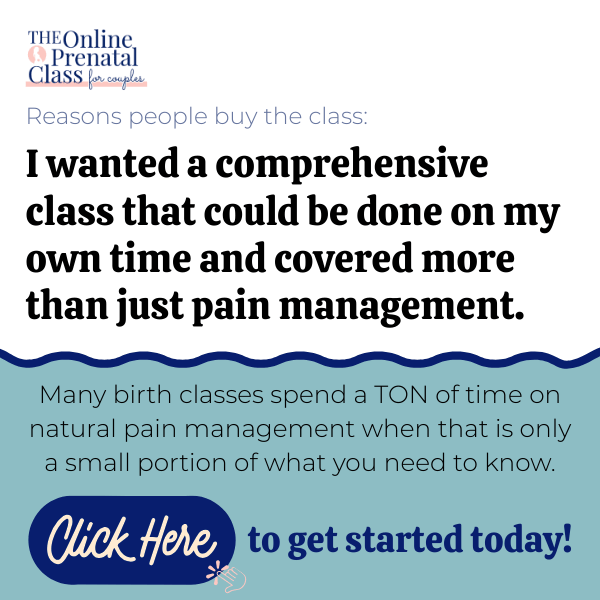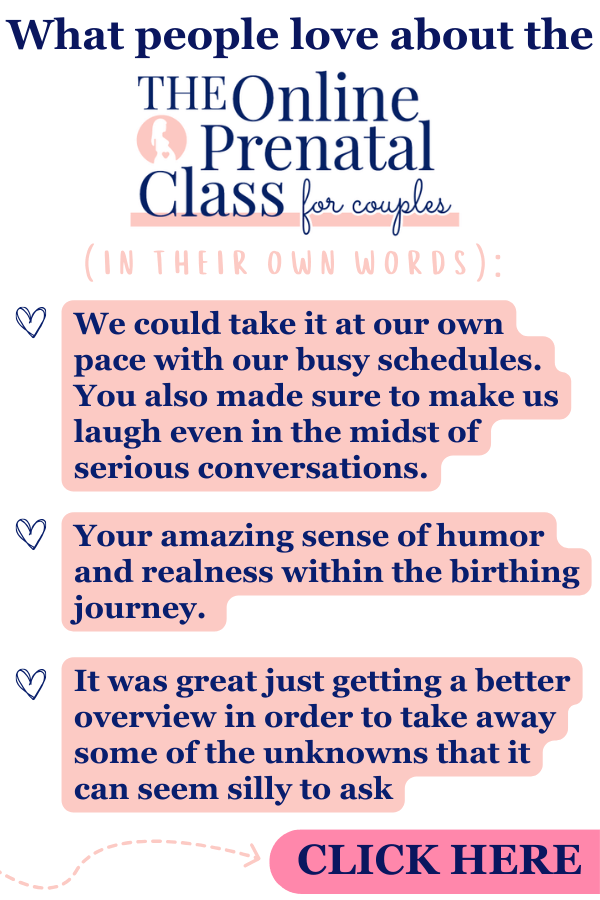📣 YOU are clearly getting prepared for pregnancy, birth & beyond — but do you wish your partner was more involved (looking for a teammate rather than just a cheerleader)? Couples love THIS! 💛🧡💚
Hearing your baby’s heart beat can be SO fun. Especially early on when it all sort of just seems like a dream. Sure, you’re tired and nauseous but is this all real? Then, the doctor finds a heart beat at your prenatal visit and suddenly you have proof that you’re growing a human inside you. So, why not have that proof CONSTANTLY? Let’s find out.
What’s a Doppler?
It’s a device like this that converts what it “sees” as movement/blood flow into sound that we can hear.
So, in the case of pregnancy it SEES the movement and translates that into that “wooshing” sound we hear in the doctor’s office.
Still zero clues, there’s also one here (affiliate link).
BTW, if you love this kind of info — I’d love to hang out with you the rest of your pregnancy too!
Benefits of Owning Your Own Doppler
There are perks to owning your own doppler. The main one that you can basically know that baby is alive. With a few caveats:
- It can be REALLY hard to use (even for me) and sometimes you’ll get yourself into a tizzy when baby is “right there” and you just didn’t find it.
- It can catch YOUR heartbeat, or placental blood flow (it sees your blood flow too) and you’ll think that is baby’s (so we always check your pulse when we do it)
So, while it can be reassuring (and I know you want that) it can also increase your stress (not great) or not actually be true.
So, when friends ask me if they should get one I say they’re expensive, hard to use but they can be fun — and somewhat reassuring if you’re just wanting to know if they’re in there.
If you’re getting one, ask your provider to help you know how to use it, they should know you have one and train you to properly use it.
Why I Don’t Recommend a Doppler in Pregnancy
Here’s the real issue.
Most often we get a heartbeat in babies — but as a nurse I then watch that heart beat as baby moves, there’s some contractions, and I see how baby is doing with those.
In the hospital we use ultrasound to watch the baby’s heart and it prints out (or shows on the computer) so we can see the long term effects on baby.
We spend hours and hours (and HOURS) learning to interpret that to know if baby is doing OK or needs to come out asap. Seriously, so much time.
So, just because you find a heart beat with your doppler and it’s in the acceptable range — doesn’t mean that baby is doing OK.
If you have alarm bells and you’re not feeling baby move (more on that) then just a quick doppler should NOT be an “ok everything is fine” moment.
BTW, do you find information like this (solid info, instead of “sounds good” info) — come join me in here.
So, what should you do instead of a doppler?
I know, I know — you WANT to know baby is doing OK. I get that. I’ve had three kids, I totally understand the anxiety and worry.
So, starting in the 3rd trimester we do kick counts.
It sounds so old school — feeling for baby to move — but fetal movement is your BEST indicator of baby’s well-being.
However, you have to do them right, and it has to be done daily at about the same time to really know how baby is doing.
Grab my cheat sheet here:
I also have a full post on fetal movement here.
I should also add for moms who have an anterior placenta, or just don’t feel baby move much at all even in their third trimester — talk with your provider about what’s best for YOU and how you can best monitor baby on your own.
What if I’m worried about baby’s movements before the third trimester?
Also valid. But this is true:
Baby’s movements just aren’t as consistent before 28’ish weeks. You’ll normally have some days where baby moves a lot, and then the next day you’ll feel hardly anything just because of how baby has shifted and where their movements are going. Both of those things are entirely normal.
If you are worried about your baby’s movements before 28 weeks talk with your provider about it. See if they recommend you go to the hospital or call them.
If you’re not feeling baby move and you’re past 28 weeks you should go to labor and delivery. However this is the real benefit of where kick counts come in because you can say:
“Normally, baby has their 10 movements in 10 minutes — it’s been that way for the last month, but today we’re well over 45 minutes and I’ve only felt 3 movements.”
It helps know how baby’s movements are changing and act in accordance (probably ordering extra tests in addition to monitoring, etc).
That’s different than you coming in to say “baby just isn’t moving today” — yes, we’re still concerned by we don’t have as many “facts” and it seems more subjective.
That isn’t to say that we don’t take it seriously. Every time a mom comes in with decreased fetal movement I hold my breath until that monitor picks baby up. Most often it’s fine, but sometimes it’s not and we want to avoid that at ALL COSTS.
Did you know that fetal kick counts, when done properly can save 1/4 stillbirths, that’s 25%!!! But you have to do them, the right way.
So, that’s what I recommend instead of a doppler. It’s mother nature’s alarm system for you, and it’s totally free (beyond the time you get to spend doing it).
Pro Tip: I did my kick counts in the evenings after dinner. Not only did baby often move a lot right after dinner, but I also didn’t have to clean-up dinner — it was a win/win for everyone. 🙂
Remember, ANY changes in fetal movement should trigger a call to your provider or a trip to labor and delivery. Talk with your provider about what you should do if you feel baby moving less/more and how to get hold of them.
Remember, increased stress and worry during your pregnancy can lead to poorer outcomes for baby. So, the more chill you can be about things (and kick counts can help you feel that way) the better. A lot of people feel anxious or stressed out about birth as well. The Online Prenatal Class for Couples aims to get rid of that in just a few short hours. So, come join me. It’s about the same price as a doppler, but WAY more useful!
Want to do a vibe check before diving into the whole thing with me? — check out my free labor pro tips. It’s your first step toward getting in the driver’s seat of your birth.








 How to Prepare for Your C-Section (Cesarean Section)
How to Prepare for Your C-Section (Cesarean Section)
